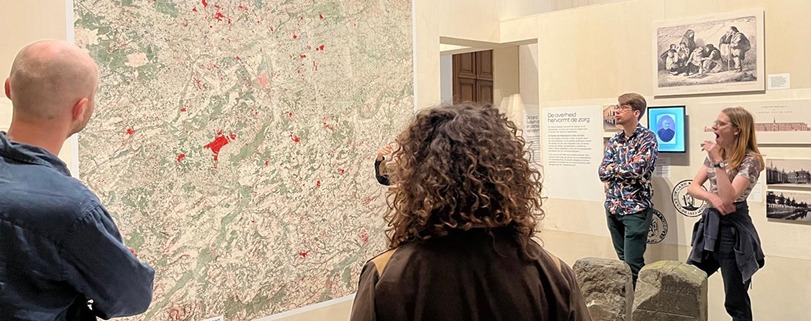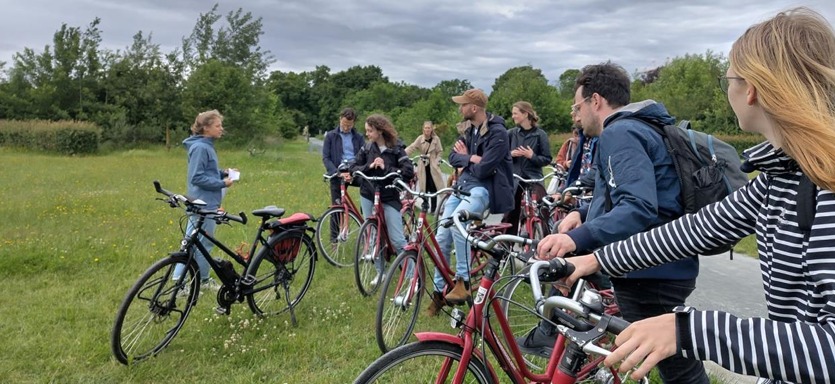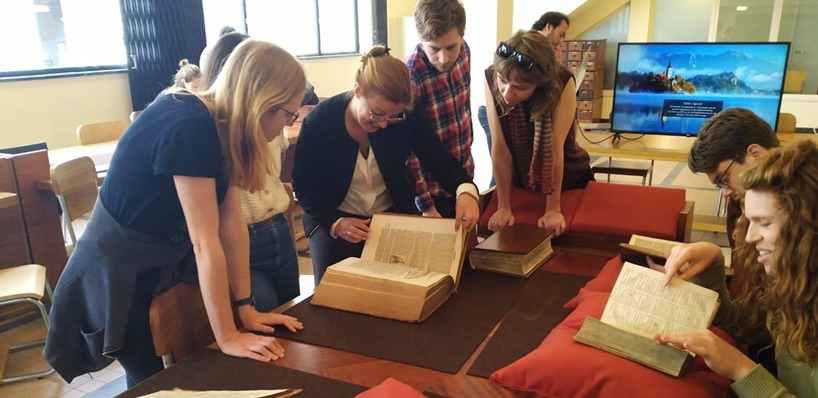Exploring the Historical Roots of Ecological Challenges: Insights from the 2024 Medieval and Early Modern Studies Spring School
What are the historical backgrounds of ecological challenges? That was the question at the heart of the Summer School: ' Medieval and Early Modern Studies Spring School 2024.
Participant Estel van den Berg shares an overview of the program.

Day 1: Unveiling Ghent’s Agricultural Legacy
On May 27th, participants gathered at the STAM museum in Ghent for the exhibition Ghent’s Lands, which traced the history of the city’s agricultural lands from the 12th century to today. This exhibition, focusing on the evolving relationship between institutions managing these lands and the farmers working them, set the stage for a week of interdisciplinary exploration into Landscape History and Ecology.
The exhibition concluded with poignant video testimonials from farmers facing the challenges of modern agricultural land sales, raising questions about the future role of these lands in addressing climate change. The day's activities continued with a bike tour of Ghent’s farmlands, highlighting eco-friendly initiatives and historical land use practices.

Day 2: Waterways and Cartographic Insights
Held at the picturesque Het Rustpunt, the second day began with a lecture by Prof. Tim Soens from the University of Antwerp. He explored the historical relationship between humans and rivers, advocating for strategies that reconnect humans with waterways, challenging the historical notion of rivers as adversaries.
In the afternoon, Prof. Iason Jongepier led a workshop on cartography using QGIS, enabling participants to visualize landscape changes over time. The day concluded with presentations from several researchers, offering innovative perspectives on historical landscapes through digital and ecological lenses.
Day 3: A Journey through the Zwin Region
Participants visited the Zwin Nature Park, where Prof. Wim De Clercq discussed the region's late-medieval maritime cultural landscape. Research pitches followed, including Joris Kingma’s analysis of sea dyke construction and Pieter-Jan Reynaert’s exploration of landscape drainage in Flanders. The afternoon session at Axel’s Warenhuis museum focused on landscape representation in Dutch country houses, with presentations tying cultural and landscape history together.


Day 4: Nature Writing and Early Modern Print Culture
Dr. Femke Kramer led a workshop on nature writing, encouraging participants to connect deeply with their environments through vivid, precise language.
The afternoon featured a lecture by Dr. Joana van de Löcht on early modern representations of nature, using rare books to illustrate changing attitudes towards the natural world.

Day 5: Colonial Ecology and the Classification of Animals
The final day began with Dr. Marrigje Paijmans’ lecture on the ecological and economic interactions in colonial Surinam, followed by Thijs Lambrecht’s exploration of how economic shifts influence human-animal relationships.
The day wrapped up with research pitches addressing topics from ecotourism in South Africa to the representation of colonial landscapes in early modern literature.
Conclusion
The 2024 Spring School offered a vibrant platform for interdisciplinary dialogue on historical and contemporary ecological challenges. Participants engaged in lively discussions, exchanging feedback and forging connections across diverse scholarly fields. This enriching experience was made possible by the collaborative efforts of various academic institutions and support from partners in Flanders and the Netherlands.
|
Organisation
The Spring School is part of the Doctoral Schools UGent programme and organised by members of the UGent Group for Early Modern Studies & Pirenne Institute, Groningen Research Institute for the Study of Culture (Rijksuniversiteit Groningen), Huizinga Institute (Dutch Graduate School for Cultural History) & Dutch Graduate School for Medieval Studies, the Centre for Urban History (UAntwerpen) and Agricola School (Groningen).
We would also like to thank the other partners from both Flanders and the Netherlands that supported this initiative: Amsterdam Centre for Studies in Early Modernity (University of Amsterdam) Institute for Early Modern History (UGent-VUB) and Onderzoeksgroep Nieuwe Tijd (KU Leuven). Organisation: Caroline Baetens, Femke Kramer, Stefan Meysman, Jeroen Puttevils, Hanneke Ronnes, Kornee van der Haven en Marrigje Paijmans. |

| Last modified: | 18 June 2024 1.49 p.m. |
More news
-
24 March 2025
UG 28th in World's Most International Universities 2025 rankings
The University of Groningen has been ranked 28th in the World's Most International Universities 2025 by Times Higher Education. With this, the UG leaves behind institutions such as MIT and Harvard. The 28th place marks an increase of five places: in...
-
05 March 2025
Women in Science
The UG celebrates International Women’s Day with a special photo series: Women in Science.
-
16 December 2024
Jouke de Vries: ‘The University will have to be flexible’
2024 was a festive year for the University of Groningen. In this podcast, Jouke de Vries, the chair of the Executive Board, looks back.

